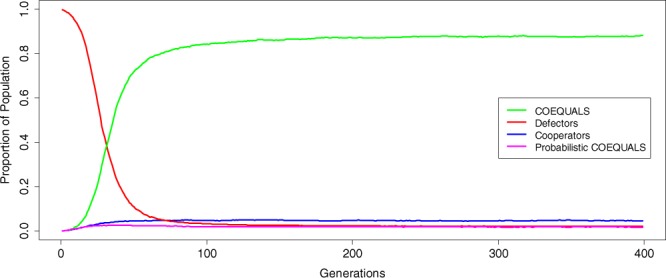Figure 6.

Robustness of COEQUALS to a variant that defects probabilistically with agents possessing the same wealth. Adopters of COEQUALS cooperate with certainty in every PD game they enter, thus raising questions about whether a variant of COEQUALS that defects with some probability in any game of a generation might outcompete the purely cooperative, baseline version of COEQUALS. Results presented in Fig. 6 show that this possibility does not materialize. The figure presents the median of the distribution of population shares of each strategy in every generation of the simulation. The results show selection against a variant of COEQUALS that probabilistically defects. Across generations, the median of the variant’s population shares reaches a maximum value of 0.025 and it dwindles beneath that value in the remaining generations, resulting in a final value of 0.016 in g = 400. To the contrary, the distribution of population shares for the purely cooperative form of COEQUALS centers on a median value that grows across generations. By the 200th generation, the median of COEQUALS’ distribution of population shares rests on a value of 0.872, which grows to its maximum value of 0.881 by the final round of the simulation. The corresponding metrics for defectors and cooperators remain at low values over those same generations, thus suggesting that the conventional form of COEQUALS remains robust to all strategies in the presence of a variant of itself that probabilistically defects. This result is consistent with the idea that COEQUALS uses wealth holdings to generate positive assortment: in such conditions, defecting on others with equal wealth holdings reduces the overall fitness of the strategy and leads to missed opportunities for mutual cooperation.
